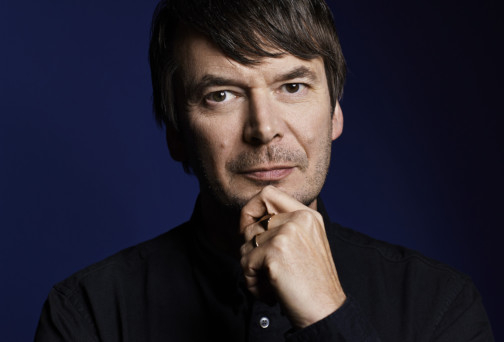
It is an inauspicious-looking place, the Oxford Bar, in Edinburgh’s New Town. It sits on a cobbled side street, its plain white facade and cast iron sign vaguely imposing. Inside, it’s the kind of pub where, almost a decade on from Britain’s smoking ban, there remains a metaphorical fug.
Yet several times a week visitors from across the US arrive here with cameras and questions.
“Some don’t even have a drink,” sighs landlord Harry Cullen. “They take their pictures and leave.”
These are among the global fans of Detective Inspector John Rebus, the fictional copper who, over 20 novels, has been cracking crime amid the real streets, pubs and tourist hubs of the Scottish capital. The devoted come here, to the Ox, where their man washes away his nights, in the same way lovers of Sherlock Holmes make the pilgrimage to 221b Baker Street.
And, just occasionally, a lucky few will bump into Ian Rankin, author of the 30 million-selling series. This is not only his character’s watering hole; it’s his too.
“And I can’t help but feel sorry for those fans,” he says. “Because it’s Rebus they want, isn’t it? They want this complex, dangerous, brooding man knocking back whisky. And, instead, there’s me with my pint and paper. I’m not Rebus. We’re not the same. I don’t even think he’d like me if we met. He’d think I was a wishy-washy liberal. It must be a let-down.”
Rankin is at his home in Edinburgh’s Merchiston district when we talk. This is his quiet time.
Soo, he’ll start five furious months of writing which will see his next novel delivered to the publishers by July — “deadlines are great,” he says, “the best ideas come when the panic kicks in.”
But before that, he has a 10-date US tour promoting his latest book Even Dogs in the Wild. He’ll perform readings of the Rebus novel in nine cities.
“The great thing about America,” he says, “is I always come back with more books and more tip-offs of who to read. It’s a country in love with crime fiction.”
Talking to the 55-year-old is hugely enjoyable. He’s wry, straightforward and affable. His mop-top and lack of airs can lull you into forgetting how ultra-successful he is. It shouldn’t. This is the single biggest-selling British crime author alive. He’s been awarded an OBE, had his work translated into 36 languages and amassed a personal fortune estimated at £25million (“Hasn’t someone just sat in the pub and made that up?” he once scoffed).
Quite often, these days, he is accused of writing literature. That may be because his works are more than mere whodunnits. The fact the Rebus series is set in real time in a real city means contemporary social issues form a constant backdrop. Immigration, addiction, sectarianism and the corruptive nature of finance have all been addressed.
“People aren’t coming to me looking for political essays or polemic — they’re looking for a rattling good story,” Rankin says. “But I think the crime novel is a good way of raising this stuff because Rebus, as a detective, has an access all areas pass to the entire city, to its riches and deprivations. He can knock on doors that we can’t. And if this city is a microcosm of Scotland and Scotland a microcosm of other parts of the world, then you can explore these issues, and say to the reader, ‘What do you think about this?’ I don’t claim to have answers, I’m just framing questions.”
In this way, he’s similar in person. He was one of the few high-profile Scottish figures who refused to reveal his stance during 2014’s independence referendum.
“I did vote but I’ll never say which way,” he declares. “My opinions should be worthless anyway. It’s the issues that are important.”
Rankin himself was born in Fife in the former mining village of Cardenden (“full of scooter hooligans”). He moved to the capital for university and wrote his earliest novels while studying a PhD in literature. He was first published at age 26 and the debut Rebus novel, Knots and Crosses, came a year later in 1987.
“I never had any desire to write crime actually,” he says. “Back then no one was writing about contemporary Edinburgh and I couldn’t understand why. It’s such a Jekyll and Hyde city; it’s cultured and historic but it also had the worst heroin problem in western Europe and appalling HIV rates. There was real poverty. And those contrasts should be meat and drink to a writer. Rebus started as a vehicle for that.”
For a decade after that first book the character remained obscure. Rankin and wife Miranda Harvey — the parents of two sons, both now in their 20s — struggled to make ends meet. He suffered panic attacks for a time. It was only when 1997’s Black and Blue was named novel of the year by the UK Crime Writers’ Association that fans came flocking.
But why does Rebus, a hard-drinking, hard-bitten loner, resonate with readers around the world? “I don’t know,” admits Rankin. “He’s an outsider, and people are perhaps drawn to that. We like those who bend rules; we get a vicarious thrill from being alongside them. He works for the police but he has elements of a maverick American PI and that may widen the appeal.”
Rankin’s prose probably help too. His influences include US legends Lawrence Block and James Ellroy. He once had dinner with the latter — “surprisingly quiet, very thoughtful, a good listener”.
Yet Rankin’s work is definitively his own. Fast, gothic, abrasive; it’s been called tartan noir. Plots tend to start small and spread into arcs of power abuse. Not that he plans it, as such.
“When I’m writing,” he admits, “I won’t know whodunnit until maybe two-thirds of the way through. Until then I know as little as my detective. I just make it up as I go along. It’s nerve-wracking, actually. You’ll be half through and not know your conclusion. You worry one of these days the ending won’t come. I’ll be left with only two-thirds of a novel.”
It seems unlikely. If anything the ideas appear to be arriving faster with time.
Rankin has always been prolific. As well as his 20 Rebus books, he’s written several standalone thrillers, a couple of non-fictions and one American gangster novella called The Lie Factory.
But today he’s also talking of turning his most famous detective into a TV series. It’s been done before, briefly, for British screens, but the 45 minute episodes — using the barest bones of a book per show — weren’t to his taste. “I’m thinking of something more expansive, like the great American or Scandinavian dramas,” he says. That’s for the future. For now, he’s back to thinking about starting that next book. It’s probably going to be Rebus 21.
“When I start I’m never sure if I’ve got anything new to say about him,” he says. “But he’s a lot of fun to spend time with. I’ve still not got to the core of what makes him tick. He still surprises me.”
–Guardian News & Media Ltd









